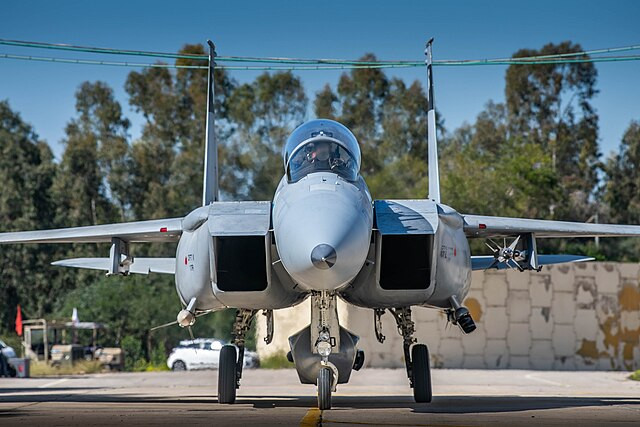Israel has intensified its military campaign against Hezbollah, targeting financial institutions linked to the Iran-backed group in Lebanon. On Sunday night, Israeli airstrikes hit locations across Lebanon, including areas near Beirut's Rafic Hariri International Airport. The strikes focused on Al-Qard Al-Hassan Association, which Israel and the United States regard as Hezbollah's de facto financial arm. The escalation follows a drone attack that targeted Israeli Prime Minister Benjamin Netanyahu's residence, which the Israeli leader blamed on Hezbollah.
The Israeli Defense Forces (IDF) stated on Monday that the targeted institution, Al-Qard Al-Hassan, "directly funds Hezbollah's terror activities, including the purchase of weapons and payments to operatives." The IDF's strikes extended to Hezbollah missile launchers in southern Lebanon that had been targeting northern Israeli communities. According to the IDF, numerous precautions were taken to minimize civilian harm, including issuing advance warnings to residents in the affected areas.
The bombing campaign has, however, forced many Lebanese civilians to flee. Officials estimate that 1.2 million people across Lebanon have been displaced due to the conflict, which escalated sharply in recent months. Among those displaced was Hussein Hamieh, who fled his home in Beirut's southern suburbs, a known Hezbollah stronghold. Holding his infant son, Hamieh expressed his determination to persevere. "We will endure famine, rain, the sea or snow, and we can live under the trees, but we won't leave our land," he told CBS News.
The attacks have also sparked widespread panic, with some residents of Beirut fleeing their homes with little notice. The United Nations Special Coordinator for Lebanon, Jeanine Hennis, described the "widespread panic" in the country, noting that civilians were given only a "brief window to escape to safety" before the strikes began. Ranim Halawani, who works with the Development for People and Nature Association in Saida, recounted the fear that gripped the community. "People were afraid and they left," she said, describing the chaotic scenes as streets filled with residents trying to find safety.
The IDF's campaign is part of a broader Israeli offensive aimed at degrading Hezbollah's military and financial capabilities. Israeli Prime Minister Netanyahu has vowed to continue the strikes until Hezbollah can no longer launch rockets and drones into Israel. Over the past year, Hezbollah has launched more than 10,000 weapons at Israeli targets in support of Hamas, another Iran-backed group. In retaliation, Israel has expanded its operations, striking deeper into Lebanese territory.
The United States, meanwhile, is attempting to defuse the escalating tensions. U.S. Secretary of Defense Lloyd Austin confirmed on Monday that the Terminal High Altitude Area Defense (THAAD) missile defense system, along with 100 American troops, had arrived in Israel. Austin emphasized that while the U.S. supports Israel's right to defend itself, it hopes to prevent an escalation that could lead to a broader regional conflict. "We have the ability to put it into operation very quickly," Austin said, underscoring the readiness of U.S. defenses in the region.
The Biden administration has made it clear that it does not support any Israeli action targeting Iran's nuclear or oil infrastructure, but officials remain unsure of how far Netanyahu's government will go in its response. "It's hard to say exactly what that (Israeli) strike will look like," Austin said, acknowledging the unpredictable nature of the conflict and the potential for further escalation.
The urgency for a diplomatic solution has also led to senior White House envoy Amos Hochstein visiting Beirut on Monday. Hochstein met with Lebanon's caretaker prime minister and the speaker of parliament, a Hezbollah ally, in an effort to broker a ceasefire. A U.S. official told CBS News that Hochstein's goal was to negotiate "an enduring arrangement that will bring a durable end to the conflict." Secretary of State Antony Blinken is also expected to travel to the Middle East to advance these diplomatic efforts.
Lebanese civilians, meanwhile, continue to suffer the brunt of the conflict. Artist Mona Jabour expressed her fears for the country's future, particularly for its youth. "People are going through hell," she said. "Everything is crumbling under our feet... young people are being brought up on violence and wars, and this is going to perpetuate new hatred, new wars." Jabour lamented the resources wasted on warfare that could instead be used to improve lives. "The money spent on arms could be spent a lot more wisely... to educate, to build homes, to create more safety," she told CBS News.
As the conflict rages on, the human toll continues to mount. Lebanese health officials report that at least 2,464 people have been killed since the hostilities began escalating last year, and the number of displaced individuals grows by the day. The United Nations has expressed concerns that Israel's military actions in Lebanon and Gaza may be contributing to the destruction of civilian populations through death and displacement.
In Gaza, Israeli forces have also intensified their offensive, particularly in the northern regions of Beit Lahia and the Jabalia refugee camp. The IDF stated on Monday that troops were dismantling militant infrastructure in the area, though local health officials reported dozens of casualties. The United Nations Human Rights Office issued a statement condemning the Israeli operations, warning that the ongoing campaign could lead to the destruction of the Palestinian population in northern Gaza.




